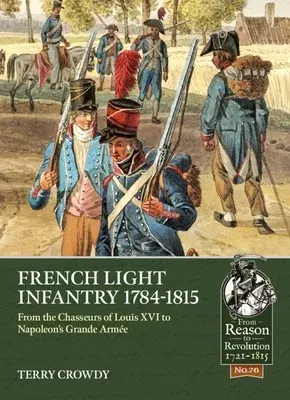In 1792 France unleashed a new form of warfare in Europe. Faced with the
well-drilled Austrian and Prussian armies, the French introduced the
tactic of mass skirmishing by tirailleurs. Soldiers were thrown forwards
and told to fight in open order. Moving quickly and making use of cover,
they fired on the enemy line, annoying it, goading it, and all the time
distracting it from the infantry columns coming up behind, bristling
with bayonets, ready for the charge and a shock action. Of these
tirailleurs, the best were the professional chasseur light infantry
battalions, raised and trained in the army of Louis XVI; but they were
too few in number. A patriotic appeal for light infantry volunteers was
made, and within two years the original twelve battalions became ninety
strong. By the time of Napoleon's invasion of Russia in 1812, there were
185 battalions of light infantry in service, with hundreds of voltigeur
light companies attached to the regular line infantry battalions.
Although all infantrymen could fight as tirailleurs, specialist light
infantry did it best, and were clearly an important part of Napoleon's
armies. Why was this?
In this book, Terry Crowdy explores the origins of the light infantry in
the century before Napoleon came to power. From bands of irregular
partisans, to sharpshooters and scouts, the book follows France's early
experiments with this arm. Drawing on contemporary documents, including
the French parliamentary archives, this book charts the expansion of the
light infantry arm, reviews the reasons behind organizational changes,
and analyses the tactics employed by light infantry in meticulous
detail. Lavishly illustrated, this book is an essential reference for
students and hobbyists of the Napoleonic Wars.

